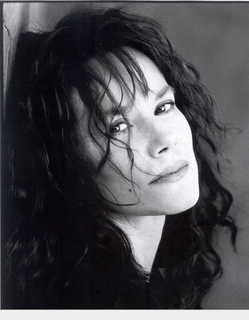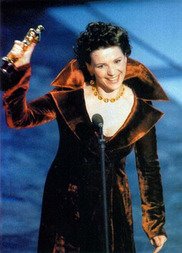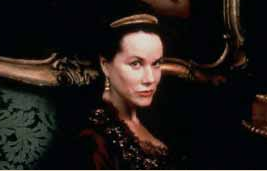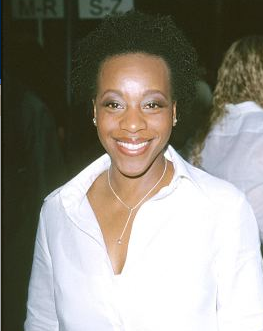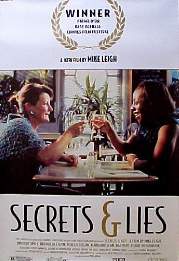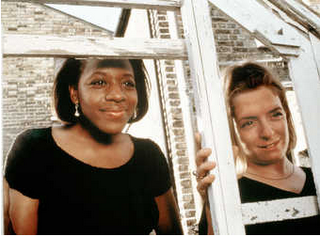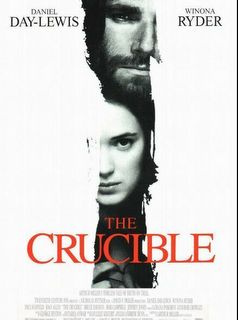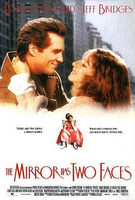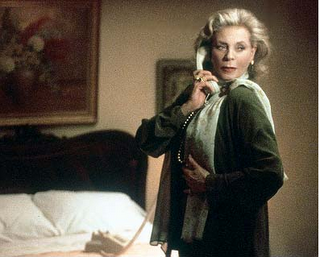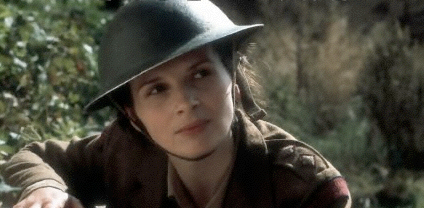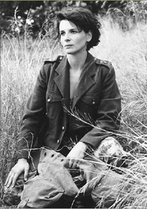 At long last, the final entry for the Suppporting Actresses of 1996. And, yes, StinkyLulu's well aware that today's not Sunday. But it's almost the same thing. (See, in one of his earliest comments on StinkyLulu's Supporting Actress Sundays project, Nick likened the Sunday morning entries to a kind of worship, church-going for the movie enthralled...Amen. Truer words ha' ne'er been spoke. And it only follows that, since true evangelicals tend to also get serviced on Wednesday as well, Wednesday's almost the same as Sunday...)
At long last, the final entry for the Suppporting Actresses of 1996. And, yes, StinkyLulu's well aware that today's not Sunday. But it's almost the same thing. (See, in one of his earliest comments on StinkyLulu's Supporting Actress Sundays project, Nick likened the Sunday morning entries to a kind of worship, church-going for the movie enthralled...Amen. Truer words ha' ne'er been spoke. And it only follows that, since true evangelicals tend to also get serviced on Wednesday as well, Wednesday's almost the same as Sunday...)But, really, who needs an excuse to exult in the divine radiance of...
Jane Campion's brooding adaptation of the beloved Henry James novel is an admirably bold venture. Discerning critics have observed that Campion's directorial take is almost a "reading of" the James original, more than a straight-up adaptation, & that seems to describe just how Campion-ish this film is. It's got all the hallmarks of Campion's idiosyncratic genius: a melancholy, at once lugubrious and exultant; a visual acuity of uncommon intelligence (at least in popular film); unparalleled investment in cinematically exploring the complicated lives, desires and experiences of women; a thematic fearlessness; and -- StinkyLulu's favorite -- a genius for casting. (Shelley Duvall and John Malkovich as siblings? Viggo Mortenson as a character named Caspar Goodwood? Nicole Kidman in a mercenary marriage to a controlling man of intense but limited charisma, the marriage itself in service to a crackpot aesthetic/spiritual ideal?)
Genius.
And perhaps the most satisfying stroke of Campion's genius for casting can be seen in Barbara Hershey's resplendent, luxurious, malevolent, desperate performance as Madame Merle.
Campion's film explores the terrifying erotics of intimacy -- not just sexuality, mind you, but the thrill of knowing another and the terror of being known... And so far as such things go, Barbara Hershey's Madame Merle is a worldly woman. Her first glance to Kidman's Isabel so envelops the younger woman with the promise of such knowing that Isabel's fluttering excitement is nearly palpable. Of course, as Campion reveals the soul-buckling power of Gilbert Osmond's (Malkovich) delicate tyranny, Hershey's Madame Merle also embodies the ravages of that heady intimacy, a barely living example of its potential toxicity. And through it all, it's Hershey's voice -- not her exceptional beauty -- that captivates. Hershey's vocality is like few others in American film: a textured womanly sound, breathy yet full, with little frippery or actressy tricks. And it's with this voice that Hershey breaks StinkyLulu's heart in The Portrait of a Lady.
It's one very simple scene that gets Lulu good: A chance encounter between Merle and Isabel, not long after Isabel has been told of the depth of Merle's deception. Isabel turns her back to Merle. Merle, the exhausted but expert social strategist, fills the heavy air with social banalities when -- all at once -- her breath seems to be forcibly sucked from her belly as she realizes that Isabel knows. Her voice strangles itself as she gasps for the words to complete her sentence and, as the camera leaves her, she struggles to remain standing.
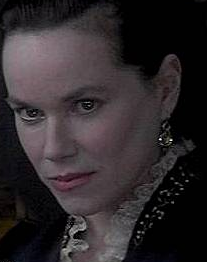
"You not only dried up my tears. You've dried up my soul."
Hershey's is an extraordinary performance -- a magnetic menace for the ages -- because the actress invests an exceptional humanity into this damaged, beautiful villain (an investment supported at every turn by Campion's singular form). Truly great work from an almost iconoclastic actress. Indeed, the kind of work the category's made for...
Even more, Hershey's Madame Merle is perhaps StinkyLulu's ideal kind of Supporting Actress role: a fully actualized character who serves the narrative in instrumental but unqualifiedly secondary ways. Unlike other 1996 nominees (Binoche & Jean-Baptiste), there's never a thought that A Portrait of a Lady's gonna turn out to really be about Hershey's character. Nonetheless, her work is so fully realized that it permits the giddy fantasy that Barbara Hershey's Madame Merle could be the star of some other, imaginary, possibly more thrilling movie -- if only the camera would just follow her instead of Nicole/Isabel.
Two tickets for Madame Merle - The Untold Story, please...
Two tickets for Madame Merle - The Untold Story, please...
Just a day or so before the Supporting Actress roster for July is announced!
It's turning out to be quite the horse race, so be sure to...
It's turning out to be quite the horse race, so be sure to...

